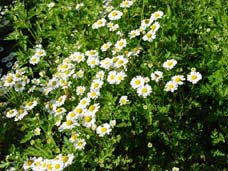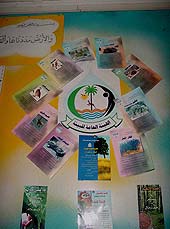|
In May 2000, an internal evaluation was carried out in a workshop setting, and the priorities and focus for Phase III (2001-2005) were agreed, namely to:
- focus on medicinal plants as a theme and emphasize close linkages and collaboration at the regional level
- integrate women's issues into the activities at the national and regional levels
- continue the emphasis on community participation.
It was also decided to emphasise the regional aspects of the Programme, as many of the plant species occur across the region, and work in one country may inform and inspire similar work in another.

The main objectives and key deliverables for Phase III are as follows:
Objective 1: Promote the conservation of endangered and economically useful plants in North Africa, with special reference to medicinal and aromatic plants.
Objective 2: Promote indigenous knowledge and the equitable participation of people in the management and conservation of endangered and economically useful plants in North Africa.
TOP 
Regional Outputs:
- Compendium published on indigenous knowledge of medicinal plants.
- Training in participatory approaches undertaken.
- Community management approaches promoted.
- Existing knowledge organised and disseminated.
- Web site for North Africa Biodiversity Programme produced.
- Gender analysis of community participation in plant conservation undertaken
- Gender workshop organised.
- Newsletter on women's perspectives published.
- Methodological and conceptual support given to national projects.
Country Outputs:
Morocco:
- Threatened and endangered medicinal and aromatic plant species determined in Toubkal National Park and classified according to their degree of rarity, together with information on their active ingredients, toxicity, method of preparation and medicinal uses.
- Experiments carried out on the extraction and chromatographic analysis of essential oils and active ingredients of medicinal and aromatic plants.
- An adapted methodology to the valorization of medicinal plants identified.
- The commercialization of plants organized under the control of local communities in partnership with the Service Provincial des Eaux et Forêts.
- Exploitation and cutting methods of plants identified.
- Traditional knowledge on medicinal and aromatic plants promoted.
- Revenues for farmers improved.
TOP 
Algeria :
- Medicinal plants reproduced and multiplicated to promote their conservation and sustainable use.
- Traditional knowledge on use of medicinal plants documented.
- Farmers trained on the techniques of inventorying, picking and multiplying medicinal plants and on their oil extraction principles.
- Comercialisation of medicinal plants studied in the Batna region.
- Hydrologic resources set up.
- The Thuriferous Juniper reforested around villages.
Tunisia :
- Traditional knowledge on medicinal and aromatic plants compiled and promoted.
- Plant populations studied in the Bouya Goum area.
- Revenues of farmers improved through the diversification of agriculture with the incorporation of medicinal and aromatic plants, through small-scale irrigation, promotion of cattle, bees, poultry and rabbit raising, as well as handicrafts.
- Living conditions improved, such as the improvement of habitats, the protection of the artificial lake, the strengthening of community organisation, among others.
TOP 
Libya :
- Conservation of endangered medicinal and economically useful plants promoted through scientific work on the germination, propagation, transplantation and cultivation of these species.
- Seeds and specimen of medicinal plants collected.
- Traditional knowledge gathered from local people, especially from women.
- Environmental education promoted.
- Biodiversity assessments carried out on protected areas in the country.
- An economic and ecological assessment of the programme activities carried out in view of their potential and constraints for multiplication at larger scale.
- A workshop organized to assess the potential of the programme findings for in-situ conservation and rehabilitation of degraded ecosystem and for awareness purposes.

Egypt :
- Medicinal Plants Centre and Garden built, to conserve and propagate useful plants currently under threat in the region, and for education and awareness raising.
- Awareness of the Bedouin in conservation of medicinal plants enhanced.
- Local perception of threats and opportunities for plant conservation investigated in a participatory way.
- Traditional knowledge about the use of plants documented to help conservation of Intellectual Property Rights (IPR).
- Know-how of medicinal and aromatic plants propagation achieved through experiments by researchers on cultivation, propagation, harvest and phytochemical investigation of the plants.
- Protected areas investigated and selected for future studies.
TOP  |


